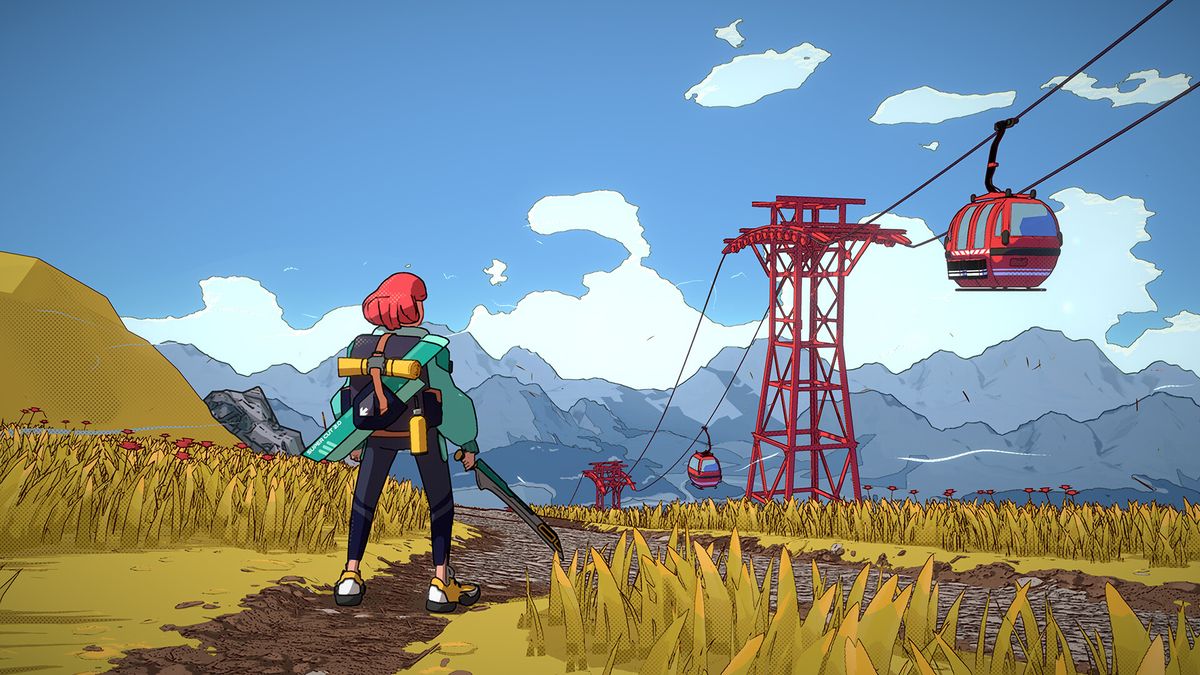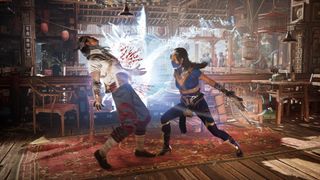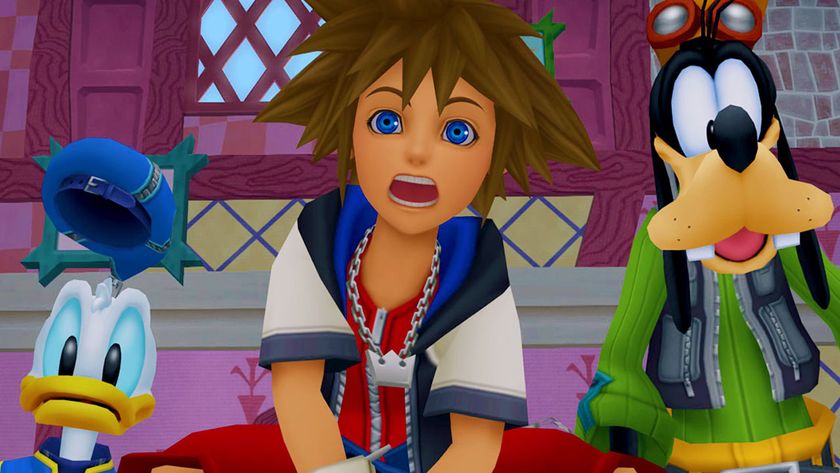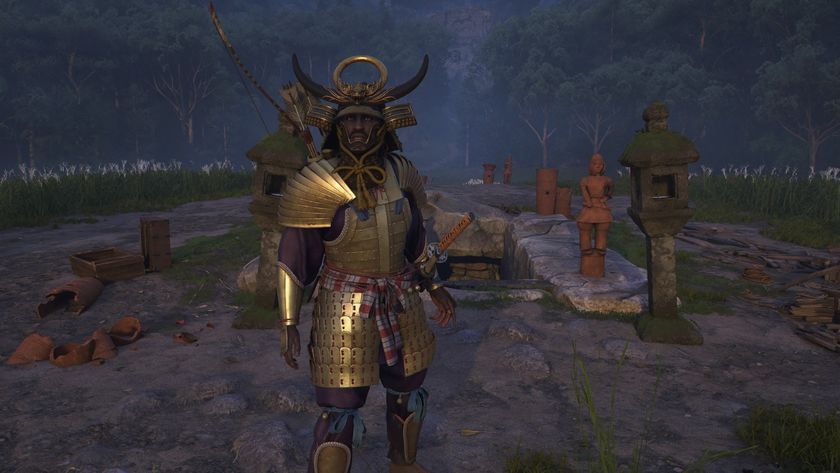This stunning cel-shaded ARPG fuses dungeon crawling, life simulation, and drinking lager in a ski lodge
Preview | The gorgeous Dungeons of Hinterberg is your next most-wanted game

At high profile events like the Xbox Games Showcase, there are always moments that steal the show. Depending on your tastes, this year's offering had plenty to choose from – Fable was larger than life, Star Wars Outlaws announced itself to the world, Obsidian said the magic words to sell us on Avowed, Still Wakes the Deep marked The Chinese Room's long-awaited return to horror, and, right near the end of the event's 65-minute run-time, Dungeons of Hinterberg wowed with its stunning cel-shaded pop art visuals.
The latter's reveal trailer started off pretty sedate, spotlighting a lone figure journaling at a desk in what looked like a hotel room. We got a closeup of their rucksack, with a rolled-up map poking out from between the bag's straps. As the camera moved deeper into the room, with a sword glistening in the light from outside, we were then suddenly whisked through the window and out into the wilderness.
What followed was a blur of snowboarding, adventuring, toying with magical portals, and sprinting into melee battles with hordes of twisted baddies. We saw the protagonist summoning lightning bolts and whirlwinds, hurtling through dark caverns on the back of a mine cart, zip-lining through the trees, and solving environmental puzzles. By the time the title ident filled the screen at the trailer's end, I felt like I'd lived through something – even if I wasn't entirely sure what that was.
"Dungeons of Hinterberg is a single-player action-RPG with some social sim elements," explained studio co-founder and game director, Philipp Seifried, during a hands-off demonstration that followed the Xbox Games Showcase. "It's set in a tiny little village in the Alps. The village used to be a skiing and hiking resort, until a few years ago when 25 magical dungeons appeared out of nowhere. These dungeons start drawing in tourists and adventurers from all over the world."
Hanging out


Filling the snowboots of one such roving, magic-wielding daredevil named Luisa, what we're shown of Dungeons of Hinterberg in motion looks stunning. With a Sable-esque pop art-inspired veneer, Luisa is seen tearing through a group of monsters said to be inspired by Austrian mythology, slashing her way to victory, grabbing some treasure, and then bailing through a portal back to the world's ski lodge hub – the same place she was seen journaling in the game's reveal trailer.
It's at this point that Dungeons of Hinterberg really switches gears. The game's co-founder and art director, Regina Reisinger, says: "Once you've successfully completed a dungeon, you go back to the village and this is where you spend the evening. This is where the social simulation elements of the game really come into play. The typical game loop of Dungeons of Hinterberg is to wake up in the morning, choose an area to explore, find and hopefully complete the dungeon, and then in the evening hang out in the village with another character. In doing so, you'll forge friendships and relationships that can really help you in your adventures."
Whether the foundations of those relationships are built on grabbing coffee at the lodge, sharing cake at the sweet shop, or taking a boat out onto the lake for some one-on-one quality time (Hinterberg itself has 10 different spots to hang out in with over 20 local residents to chat up and forge relationships with), the goal is simple: get to know a companion well enough so that they pass on knowledge tied to a specific dungeon or area, or teach you a special ability or type of magic that'll help you succeed out in the wild. In the demo segment we're shown, Luisa meets traveling journalist Travis who she's promised to give an interview to about her dungeon-pillaging exploits.
Sign up to the 12DOVE Newsletter
Weekly digests, tales from the communities you love, and more






"I quite like the idea of interactions being fundamentally self-serving – akin to old-school point-and-click adventures games where you almost always asked questions with a prescribed agenda."
Resinger continues: "Getting to know characters sort of acts as your skill tree in the game. By speaking to characters there are plenty of rewards you can uncover, for example: Travis is happy with the interview you give him and the material he gets from it, and as thanks he gives Luisa an attack conduit [that helps in battle]. This is a reward for reaching a relationship level up with him. Befriending other locals and other adventurers will really help you. Not just specific items, but reaching new relationship levels might help you unlock extra game systems, or increase your stats."
Once Luisa is back in the throes of another dungeon, she's shown deciphering environmental puzzles between more bouts of breakneck battles; before, once again, returning to her après-ski endeavors ahead of sundown. With that, Dungeons of Hinterbergs two overlapping qualities are tightly-bound: its combat and exploration elements are complemented by the relationship bonuses you accrue away from each dungeon; and the relationship bonuses help you learn more about the lands you're exploring – all told perpetuating an abstract Metroidvania-like framework where actions in one world informs those in the other, and vice versa.
Resinger informs that Dungeons of Hinterberg won't include romance options on the life sim side of its makeup (at least not at launch), and while this is bound to upset some would-be players, I quite like the idea of interactions being fundamentally self-serving – akin to old-school point-and-click adventures games where you almost always asked questions with a prescribed agenda.
As it stands, Dungeons of Hinterberg is without a concrete release date, but is angling for a tentative "2024" launch. We've already come to the realization that next year is going to be massive for video games – and while that certainly applies to the big-budget AAA headliners, you should totally keep your eyes peeled for more on games like Dungeons of Hinterberg in the coming months.
Here are some of the best upcoming indie games for 2023 and beyond

Joe Donnelly is a sports editor from Glasgow and former features editor at 12DOVE. A mental health advocate, Joe has written about video games and mental health for The Guardian, New Statesman, VICE, PC Gamer and many more, and believes the interactive nature of video games makes them uniquely placed to educate and inform. His book Checkpoint considers the complex intersections of video games and mental health, and was shortlisted for Scotland's National Book of the Year for non-fiction in 2021. As familiar with the streets of Los Santos as he is the west of Scotland, Joe can often be found living his best and worst lives in GTA Online and its PC role-playing scene.












